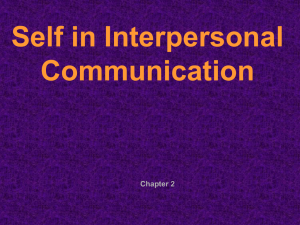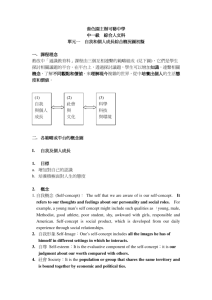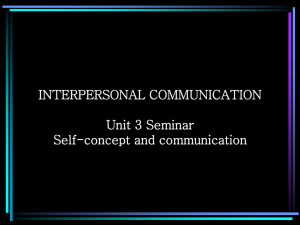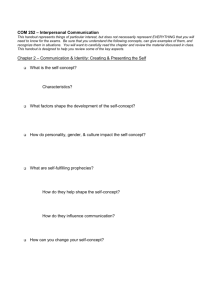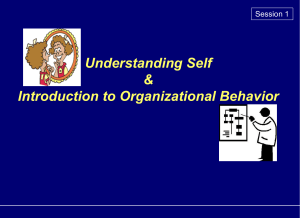Document 11960519
advertisement
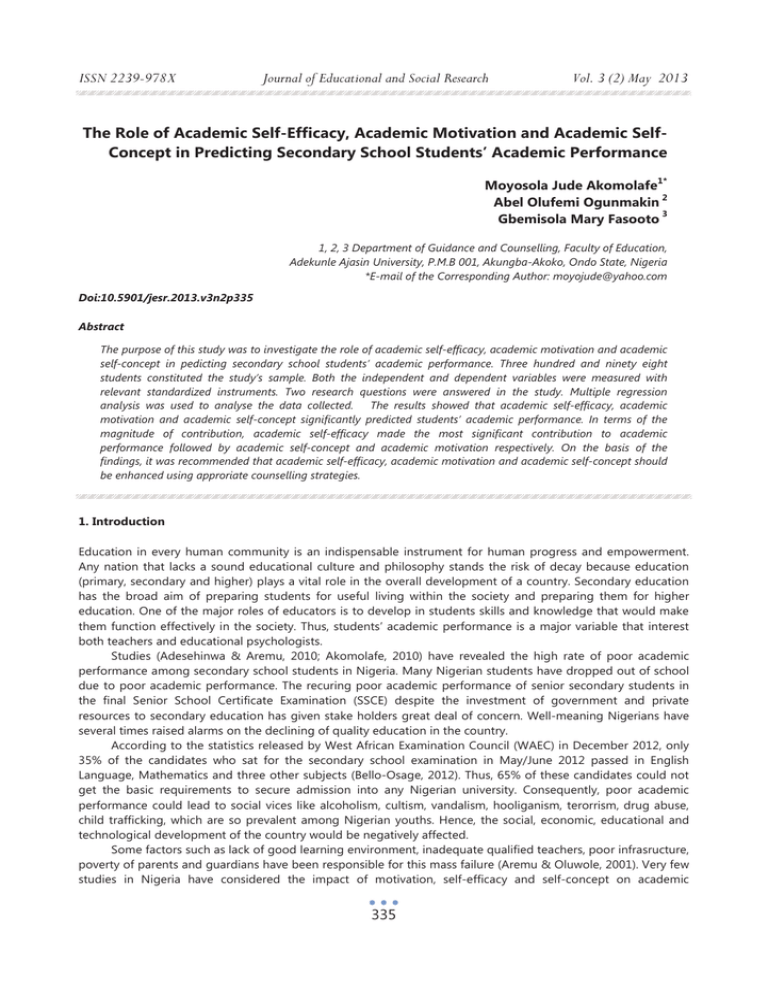
ISSN 2239-978X Journal of Educational and Social Research Vol. 3 (2) May 2013 The Role of Academic Self-Efficacy, Academic Motivation and Academic SelfConcept in Predicting Secondary School Students’ Academic Performance Moyosola Jude Akomolafe1* 2 Abel Olufemi Ogunmakin 3 Gbemisola Mary Fasooto 1, 2, 3 Department of Guidance and Counselling, Faculty of Education, Adekunle Ajasin University, P.M.B 001, Akungba-Akoko, Ondo State, Nigeria *E-mail of the Corresponding Author: moyojude@yahoo.com Doi:10.5901/jesr.2013.v3n2p335 Abstract The purpose of this study was to investigate the role of academic self-efficacy, academic motivation and academic self-concept in pedicting secondary school students’ academic performance. Three hundred and ninety eight students constituted the study’s sample. Both the independent and dependent variables were measured with relevant standardized instruments. Two research questions were answered in the study. Multiple regression analysis was used to analyse the data collected. The results showed that academic self-efficacy, academic motivation and academic self-concept significantly predicted students’ academic performance. In terms of the magnitude of contribution, academic self-efficacy made the most significant contribution to academic performance followed by academic self-concept and academic motivation respectively. On the basis of the findings, it was recommended that academic self-efficacy, academic motivation and academic self-concept should be enhanced using approriate counselling strategies. 1. Introduction Education in every human community is an indispensable instrument for human progress and empowerment. Any nation that lacks a sound educational culture and philosophy stands the risk of decay because education (primary, secondary and higher) plays a vital role in the overall development of a country. Secondary education has the broad aim of preparing students for useful living within the society and preparing them for higher education. One of the major roles of educators is to develop in students skills and knowledge that would make them function effectively in the society. Thus, students’ academic performance is a major variable that interest both teachers and educational psychologists. Studies (Adesehinwa & Aremu, 2010; Akomolafe, 2010) have revealed the high rate of poor academic performance among secondary school students in Nigeria. Many Nigerian students have dropped out of school due to poor academic performance. The recuring poor academic performance of senior secondary students in the final Senior School Certificate Examination (SSCE) despite the investment of government and private resources to secondary education has given stake holders great deal of concern. Well-meaning Nigerians have several times raised alarms on the declining of quality education in the country. According to the statistics released by West African Examination Council (WAEC) in December 2012, only 35% of the candidates who sat for the secondary school examination in May/June 2012 passed in English Language, Mathematics and three other subjects (Bello-Osage, 2012). Thus, 65% of these candidates could not get the basic requirements to secure admission into any Nigerian university. Consequently, poor academic performance could lead to social vices like alcoholism, cultism, vandalism, hooliganism, terorrism, drug abuse, child trafficking, which are so prevalent among Nigerian youths. Hence, the social, economic, educational and technological development of the country would be negatively affected. Some factors such as lack of good learning environment, inadequate qualified teachers, poor infrasructure, poverty of parents and guardians have been responsible for this mass failure (Aremu & Oluwole, 2001). Very few studies in Nigeria have considered the impact of motivation, self-efficacy and self-concept on academic 335 ISSN 2239-978X Journal of Educational and Social Research Vol. 3 (2) May 2013 performance. Thus, the purpose of this study was to examine the contributions of academic self-efficacy, academic motivation, and academic self-concept to academic performance of secondary school students. Academic self-efficacy has been defined “as personal judgements of one’s capabilities to organise and execute course of action to attain designated types of educational performance” (Zimmerman, 1995, p. 203). Academic self-efficacy promotes academic achievement directly and indirectly by increasing academic aspirations and prosocial behaviours (Bandura, Babaraneli, Caprara & Pastorelli, 1996). Many other reseachers have reported a direct positive relationship between academic self-efficacy and academic achievement (Chemers, Hu & Garcia, 2001; Green, Miller, Crowson, Duke & Akey, 2004; Robbins, Lauver, Le, Davis, Langley & Carlstrom, 2004; Sharm & Silbereisen, 2007). Other studies have identified academic self-efficacy as a predictor of American India students’ academic achievement and persistence in post-secondary academic activities (Lin, 1990; Brown & Robinson Kurpius, 1997; Jackson&Smith, 2001; Hill, 2003). In the study carried out by Linner, Bank and Pintrich (2002), academic self-efficacy correlated positively with academic outcomes in elementary and secondary school students. Most of the studies on the relationship between academic self-efficacy and academic performance reviewed were carried out in Europe & Asia. Few studies on these variables have been reported in Nigeria. This is an important gap which this study intended to fill. Another variable of interest is academic motivation. Motivation is the process whereby goal directed activity is instigated and sustained. It is a force that energizes and directs behaviour towards a goal (Eymur & Geban, 2011). It is one of the most important pyschological concepts in education (Eggen & Kauchak, 1994). According to Deci & Ryan (1985), there are three main types of motivation which are intrinsic motivation, extrinsic motivation and amotivation. Intrinsic motivation arises from a desire to learn a topic due to its inherent interests, desire for selffulfilment and enjoyment and desire to achieve a mastery of a subject. The place of behaviour in intrinsic motivation is completely internal. Intrinsic motivation for a task is shown when the individual carries out the task out of enjoyment or inherent satisfaction (Ryan & Deci, 2000; Vallerand & Ratelle, 2002). On the other hand, extrinsic motivation is a motivation to perform a task and succeed for the sake of accomplishing specific result or outcome. Extrinsically motivated learners place their locus of behavioural control outside of themselves. Their behaviours are shaped by external elements including rewards and purnishments. Such individuals consistently perform tasks for the purpose of recieving a reward (or avoiding a punishment). This undermined the principle of autonomy and may lead to both decreased persistence and increased feeling of control loss (Vansteenkiste, Len & Deci, 2006). Students who are grade-oriented are extrinsically motivated, whereas students who seem to truely embrace their work and take a genuine interest in it are intrisincally motivated. Amotivation is the demonstration of the belief that one’s behaviour is the result of something out of conscious (Cokley, 2000). It is the abscence of any self-determination (Deci & Ryan, 1985). An example of an amotive student is one who cannot really explain the reasons why he/she goes to school. A great deal of research has found that students who possess high academic motivation are more likely to have increased level of academic achievement and have lower dropout rates (Blank, 1997). Other studies have reported positive relationship between motivation and academic performance and success (Gottfried, 1990; Grolnick, Ryan & Deci 1991; Wong & Csikszentmihalyi, 1991; Ames, 1992; Mtchell, 1992; Schiefele, Krapp & Winteler, 1992; Fortier, Vallerand, Guay, 1995; Pintrich & Maehr, 1995; Johnson, 1996; Green, Nelson, Martin, Marsh, 2001; McInerney, 2001; Sandra, 2002; Eymur & Geban, 2011). The relationships between academic motivation and learning outcomes such as academic performance, have been established in the literature. However, a few of these studies were carried out in Nigeria. Indeed, to the best of the researchers’ knowledge, the relationship between academic motivation and academic performance has not been examined among the target population for the present study. Self-concept is another variable to be examined in this study. It is described as how a person understands himself as an individual who has a set of unique or special characteristics (Shek, Lee, & Chan, 1998). Such beliefs and opinions are based on individual sensitivity and self-awareness about his strengths and weaknesses. Selfconcept is a multi-dimensional construct that refers to an individual’s perception of “self” in relations to some characteristics, such as academic and non-academic (Bong & Clark, 1999), gender roles and sexuality (Hoffman, 2004), racial identity (Aries, Oliver, Blount, Christadi, Fredman, Lee, 1998), and many others. It is a collection of 336 ISSN 2239-978X Journal of Educational and Social Research Vol. 3 (2) May 2013 beliefs about oneself (Leflot, Onghena & Colpin, 2010). Academic self-efficacy refers to the personal beliefs someone develops about his academic abilities or skills. According to Strage and Brant (1999), self-concept could be positive or negative. An individual that is confident and sure of himself, with good interests and objectives, could be said to have positive self-concept. On the contrary, individuals with low self-concept usually demonstrate no satisfaction, unhappiness, easily sulk and displeased. They are often criticized by their parents, teachers, friends or anyone around them. Many studies carried out in Europe and other Western countries showed that higher levels of self-concept are linked to various education outcomes such as academic effort, coursework selections, educational aspirations and academic achievement (Marsh, 1990; Marsh & Craven, 1997; Kobal & Musek, 2001; Marsh & Hau, 2003). Therefore, this study also sought to find out if there is significant relationship between self-concept and academic performance of secondary school students in Nigeria. The main focus of the present study was to determine if some psychological factors such as academic self-efficacy, academic motivation and academic selfconcept would significantly predict students’ academic performance in Nigeria. Based on the review of the literature, the following research questions were raised: 1. What is the joint contribution of academic self-efficacy, achievement motivation, and self-concept to academic performance of secondary school students? 2. What is the relative contribution of each of the indepedent variables (academic self-efficacy, academic motivation and academic self-concept) to academic performance of secondary school students? 2. Research Methodology 2.1 Research Design The Study used correlational type of descriptive design that utilized questionnaires to obtain data from the respondents. This design enabled the researchers to establish the relationships among the four variables used in the research work. 2.2 Participants The sample consisted of 398 Senior Secondary School Three (SSS 3) students [Male = 204 (51,3%); Female = 194 (48,7%)] randomly selected from 10 secondary schools in Ondo State, Nigeria. The mean age of the sample was 15.28 years (SD = 1.67), range = 10 – 19 years The researchers used stratified random sampling technique to choose the sample of the study. 2.3 Instruments 2.3.1 Self-in-School Scale: The self-in-school scale by Downs (2005) was used to measure the levels of the students’ academic self-efficacy. The scale is a 15 item likert scale with options ranging from Completely false (1) to completely true (7). The items in the scale include “I have the ability to do well in my school work, I am doing a good job in my classes”. The scale has crombach (į) of 0.91. 2.3.2 Students’ Academic Achievement Motivation: This scale was developed by Aremu and Hammed (2002). It is the 2nd inventory in Ibadan-Multidynamic inventories of achievement motivation. I consists of 20 items, developed on the 5-Point Likert Scale and validated by the researchers whereby the crombach (į) = 0.78 and the reliability coefficient using test re-test r = 0.85. 2.3.3 Academic Self-Concept Scale:Academic Self-Concept Scale (ASCS) was developed by Akinboye, (2001). This is a 30-item questionnaire that elicits information from the subjects on how they perceived themselves in relation to their academic performance. The respondents were to indicate their degree of agreement with each item by ticking one of the options provided which are, Not Sure (NS) = 1; Least Sure (LS) = 2; Sure (S) = 3 and Very Sure (VS) = 4. Range of scores is 30 – 120. The co-efficient of internal consistency Crombach’s alpha of the scale (į) = 0.70. The test-retest reliability coefficient obtained was 0.81. 337 ISSN 2239-978X Journal of Educational and Social Research Vol. 3 (2) May 2013 2.4 Procedure The survey forms containing all the three scales (Self-in-School Scale, Academic Motivation Scale and Academic Self-Concept Scale) and demographic questions were administered to the randomly selected repondents. Two research assistants who were undergraduate students, who had been provided with instructions regarding the administration procedure, administered the survey forms. It was ensured that enough time was given to the respondents to complete the questionnaire. The respondents were allowed and encouraged to express their honest feelings without any bias. Also, the scales were retrieved from the respondents immediately after completion. The results of the respondents in their promotion examination were used to determine their academic performance. 2.5 Data Analysis Multiple regression analysis was used to analyse the research questions. Academic self-efficacy, academic motivation and academic self-concept served as independent variables while academic performance served as the dependent variable. 3. Results and Discussion Table 1: Means, Standard Deviations and Inter-correlational matrix of predictor variables and academic performance (N = 398) * = P < 0.05 (Significant results) Table 1 summarizes the zero-order Pearson correlations between academic performance and other measures in the study. The results showed that significant positive correlations were obtained between academic performance and academic self-efficacy (r =.39, p < 0.05), academic motivation (r = .42, p < 0.05), academic selfconcept (r = .36, p < 0.05). Table 2: Summary of Multiple Regression Analysis between the predictors variables and the criterion measure. Multiple R Multiple R-square Adjusted R-square Standard error of the estimate = .72 = .57 = .56 = 8.43 Analysis of variance (ANOVA) Model Regression Sum of squares 18843.34 Df 3 Mean square 6281.11 Residual 51494.37 394 130.70 Total 70337.71 397 F 48.06 P 0.05* * = P < 0.05 (Significant result) Table 2 shows the analysis of the combined effect of academic self-efficacy, academic motivation, academic self-concept on academic performance of secondary school students. The results of the analysis 338 ISSN 2239-978X Journal of Educational and Social Research Vol. 3 (2) May 2013 yielded a coefficient of Multiple Regression of 0.72 and Multiple Regression Square (Adjusted) of 0.56. This showedthat 56% of the total variance in academic performance of secondary school students was accounted for by the linear combination of predictor variables (academic Self-efficacy, academic motivation, self-concept). In determining the level of significance between the criterion measure and predictor variables, Analysis of Variance (ANOVA) was employed and the f-calculated value was 48.06. This is significant at 0.05 level F(2, 193) = 48.06; p < .05).Therefore, academic self-efficacy, academic motivation and academic self-concept when pulled together significantly predicted academic performance of secondary school students. Table 3: Relative Contribution of the Independent Variables to the Prediction. Predictor Variables Unstandardized Coefficients DŽ SEB Standardized DŽ t P Academic Self-efficacy 0.33 0.06 0.27 5.55 0.05* Academic Motivation 0.32 0.08 0.20 4.05 0.05* Academic self-concept 0.30 0.06 0.22 4.81 0.05* * = P < .05 (Significant results) The results obtained in Table 3 show that each of the independent variables made a significant contribution to the prediction of academic performance. In terms of the magnitude of contribution, academic self-efficacy made the most significant cotribution (Beta = 0.27, t = 5.55; P < 0.05) to academic performance. Other variables made significant contributions in the following order: academic self-concept (Beta = 0.22, t = 4.81; P < .05) and academic motivation (Beta = 0.20, t = 4.05; P < 0.05). 4. Discussion of Findings This study explored the contributions of academic self-efficacy, academic motivation and academic self-concept to the prediction of academic performance of secondary school students. The result of the first reseach question revealed that the three independent variables had a joint effect on the academic performance of the subjects. The magnitude of the effectiveness of the three independent variables was shown in the value of R = 0.72 and 2 R (adjusted) = 0.56. The result also showed that 56% of the variance in the academic performance of secondary school students was accounted for by the linear combination of the three variables. The result was indeed reinforced by the value of F-ratio (F = 48.06, P < 0.05). The implication of this result is that, the capacity of the three independent vartiables to predict academic performance could not have happened by chance. This finding is in consonance with the works of previous reseachers (Adeyemo, 2001; Fortier, Vallerand & Guay, 1995; Green, Nelson, Martin & March, 2006). The significant impact of academic self-efficacy is best understood when it is realised that learners who possess high levels of self-efficacy are not intimidated. They usually view challenges encountered when carrying out complex assignments and projects as opportunity for growth and mastery. When they are faced with difficult situations, such as failures, they continue to persist until success is achieved. To such students, failure is a temporal challenge that they would have to overcome. Therefore, the outcome of this study confirmed the findings of Bandura (1989), Zimmerman et al. (1992) and Akomolafe (2010) that academic self-efficacy significantly influenced academic success. The findings of Chemmers et al (2001), Green, et. al (2004), and Sharma and Silberreisen (2007) also lend credence to the findings of this study. After academic self-efficacy, in terms of contribution to the prediction of academic performance in the study is academic self-concept. The importance of self-concept in the academic development of the child cannot be underestimated. The finding of this study agrees with the outcome many previous research works that demonstrated significant relationship between self-concept and various learning outcomes of such as academic effort, course work selections, educational aspirations and academic achievement (March 1990; Marsh & Craven 1997; Marsh& Haw, 2003). This finding is worthwhile in that the reflection of an individual’s behaviour which is known as self-concept comprise among others, self-image, self-acceptance, self-perception, self-identity and self-worth. It is the key 339 ISSN 2239-978X Journal of Educational and Social Research Vol. 3 (2) May 2013 element in the nature of one’s personality which implies active intellectual awareness and control. It is an important factor in the understanding of human behaviour. Positive self-concept enhances one’s happiness, selfperception, self-esteem and it improves a person’s total life. Therefore, students with high self-concept would learn and perform better in their studies than their counterparts with low self-concept. Although, academic motivation made the least contribution to academic performance, it is however, significant. This agrees with Bank and Finlapcon (1980) who found that successful students had a significantly higher motivation for achievement than unsuccessful students. Moreover, Johnson (1996), Broussard and Gamison (2004), Skaalvik and Skaalvik (2004), Skaalvik and Skaalvik (2006) and Sandra (2002) revealed significant relationship between academic performance and motivation. In Nigeria, a study carried out by Ajayi (1998) on achievement motivation using 276 students revealed that there was a significant relationship between academic performance and motivation. Similarly, the report by John (1996) that academic achievement is highly correlated with students motivation lends credence to the present findings. This finding is also not surprising because students who are intrinsically motivated academically usually display increased time on task, more elaborate processing and monitoring of comprehension, selection of more difficult tasks, a deeper and more efficient performance in learning strategies, greater creativity and risk taking, even, in the abscence of an extrisinc reward. Hence, academically motivated students stand the chance of performing very well in their studies. 5. Conclusion and Recommendations The findings of the present study have important implications for teachers as well as educational and counselling psychologists. Teachers should realise that academic performance is influenced by several factors of which academic self-efficacy, academic self-concept and academic motivation are fundamental components. Academic self-efficacy is a construct that could be learned. It is rooted in learning by observation and direct personal experience. Thus, secondary school education programme should be designed in a way that emphasis would be layed on giving students the opportunity to participate in school activities and decision making. In addition, teachers should work hard to develop and improve students’ self-concept. Parents should give attention to the internal and external factors which may influence the self-concept of their children. The school counsellors need to encourage and support students to develop a positive self-concept and strive to achieve excellent academic performance. Counselling techniques such as self-management strategies and problem solving training could be used by the school counsellors to achieve this goal. The findings of this study also demostrated that motivation is fundamental to learning and achievement in the classroom. Therefore, each student shoud actively be involved in the classroom activities. Since the needs of each student in participating in activities differ, then, teachers and counselling psychologists need to know each students personally with his or her unique needs, interests and challenges. Flexible techniques of involving individual student should be adopted. Classroon activities should be made very interesting and challenging to students’ efforts. The difficulty level of the task given to each child should commensurate with his/her capability. Support and encouragement should be given to each student as he/she does his/her best to complete the assigned task. Teachers and counselling psychologists should be free with praise and constructive in criticism. Negative comments should pertain to particular performances and not the performer. Nonjudgemental feedback should be offered on students’ work. Teachers should stress opportunities for each student to improve and look for ways to stimulate advancement. References Adesehinwa, O. A. & Aremu, A. O. (2010). The relationship among predictors of child, family, school, society and the government and academic achievement of senior secondary school students in Ibadan, Nigeria. Procedia Social and Behavioral Science, 5, 842–849. Adeyemo, D.A. (2001). Self-efficacy and subject enrolment in secondary schools: An empirical inquiry. Ibadan Journal of Educational Studies, 1(1), 86-95. Akinboye, J.O. (2001). Adolescent Personal Data Inventory (APDI) and Adolescent Behaviour Assessment (ABA) Users Manuals, Ibadan, CYFO Behaviour Services Limited. 340 ISSN 2239-978X Journal of Educational and Social Research Vol. 3 (2) May 2013 Akomolafe, M.J. (2010). Measured Influence of Self-efficacy and gender in secondary school Students academic performance in Ondo State Nigeria. Educational Thought Journal, 7(1), 1-10. Ames, C. (1992). Classroom: Goals structure and students motivation. Journal of Educational Psychology, 86, 261-271. Aremu, O.A. & Hammed, A. (2002). Students’ academic achievement motivation. Ibadan Multi-Dynamic Inventories of Achievement Motivation. Ibadan, Stirling-Horden Publishers (Nig.) Ltd. Aries, E., Olver, R.R., Blount, K., Christadi, K., Fredman, S., & Lee, T. (1998). "Race and gender as components of the working self-concept." The Journal of Social Psychology, 138(3), 277-290. Bandura, A., Barbaranelli, C., Caprara, G. V., & Pastorelli, C. (1996). Multifaceted impact of self-efficacy beliefs on academic functioning. Child Development, 67, 1206-1222. Bank, C. & Finlapson, W. (1980). Successful motivation of students in academic activities in McClelland, D.C. AppletonCentury-Crafts. Bello-Osage, K. (2012). WAEC releases Nov/Dec WASSCE results. The Nation, Dec 21. Available at http://thenationonlineng.net/new/news-update/waec-releases-novdec-wassce-results/ (Accessed on March 3, 2013) Blank, W. (1997). Authentic instruction. In W.E. Blank & S. Harwell (Eds.), Promising practices for connectinghigh school to the real world (pp. 15-21). Tampa, FL: University of South Florida. (ERIC Document Reproduction Service No. ED 407 586) Bong, M., & Clark, R. E. (1999). Comparison between self-concept and self-efficacy in academic motivation research. Educational Psychologist, 34(3), 139-153. Broussard, S.C., & Garrison, M.E. (2004). The relationship between classroom motivation and academic achievement in elementary school-aged children. Family Consumer Sci. Res. J. 33(2): 106-120. Brown, L., & Robinson Kurpius, S. (1997). Psychological factors influencing academic persistence of American indian college students. Journal of College Students’ Development, 38(1), 3 – 12. Chemers, M.M., Hu, L., & Garcia, B.F. (2001). Academic self-efficacy and first-year college student performance and adjustment. Journal of Educational Psychology, 93, 1, 55-64. Cokley, K.O. (2000). Examining the Validity of the academic motivation scale by comparingscale construction to SelfDetermination Theory. Psychological Reports, 86, 560-564. Deci, E. L., & Ryan, R. M. (1985). Intrinsic motivation and self-determination in human behavior: New York: Plenum Press. Downs, P. A. (2005). A comparison of student and parent perceptions of academic efficacy, abilities and support: Their impact on Native American high school students academic achievement. Unpublished doctoral dissertation. Brigham Young University, Provo, UT. Eggen. P. & kauchak, D. (1994). Educational psychology: classroomconnections. Newyork: Macmillan college publishing college. Eymur, G. & Geban, O. (2011). An Investigation of the relationship between motivation and academic achievement of pre-service chemistry teachers. Education and Science, 36(161), 246-255. Fortier, M.S., Vallerand, R.J. & Guay, F. (1995). Academic motivation and school performance: Toward a structural Model. Contemporary Educational Psychology, 20, 257-274. Gottfried A., E., (1990) Academic intrinsic motivation in young elementary school children. Journal of Educational Psychology, 82(3), 525 – 538. Green, J., Nelson, G., Martin, A.J., & Marsh, H. (2006). The causal ordering of self-concept motivation and its effect on academic achievement. International Educational Journal, 7(4), 534-546. Greene, B.A., Miller, R.B., Crowson, M., Duke, B.L., & Akey, K.L. (2004). Predicting high school students’ cognitive engagement and achievement: Contributions of classroom perceptions and motivation. Contemporary Educational Psychology, 29, 462-482. Grolnick, W.S., Ryan, R.M., & Deci, E.L. (1991). Inner resources for school achievement: Motivational mediators of children’s perceptions of their parents. Journal of Educational Psychology, 83(4), 508–517. Hill, C. L. (2003). Academic achievement and cultural identity in rural Navajo high school students. (Doctoral dissertation, Brigham Young University. Dissertation Abstracts International, 65-B, 463. Hoffman, R. M. (2004). Conceptualizing heterosexual identity development: issues and challenges. Journal of Counseling and Development, 82(3),375+. Jackson, A. P., & Smith, S. A. (2001). Postsecondary transitions among Navajo Indians. Journal of American Indian Education, 40 (2), 28-47. Johnson, J.O. (1996). Child Psychology. Wusen Press Limited. Calabar, Nigeria. Kobal, D. & Musek, J. (2001). Self-concept and academic achievement: Slovenia and France. Personality andIndividual Differences, 30(5), 887-899. 341 ISSN 2239-978X Journal of Educational and Social Research Vol. 3 (2) May 2013 Leflot, G., Onghena, P., & Colpin, H. (2010). Teacher-Child Interactions: Relations with children’s self-concept in second grade. Infant and Child Development, 19(4). 385-405. Lin, R. L. (1990). Perception of family background and personal characteristics among Indian college students. Journal of American Indian Education, 29, 19-26. Marsh, H.W. & Craven, R. (1997). Academic self-concept: Beyond the dustbowl. In G. Phye(Ed.), Handbook of Classroom Assessment: Learning, Achievement, and Adjustment. Orlando, FL: Academic. Marsh, H.W. & Hau, K. (2003). Big-fish-little-pond-effect on academic self-concept. A cross cultural (26 country) test of the negative effects of academically selective schools. American Psychologist, 58(5), 364-376. Marsh, H.W. (1990). Causal ordering of academic self-concept and academic achievement: A Multi wave, longitudinal panel analysis. Journal of Educational Psychology, 82(4), 646-656. McInerney, D.M. (2001). Relationships between motivational goals, sense of self, self-concept and academic achievement: A comparative study with Aboriginal and non-Aboriginal students. Paper presented at the Annual Meeting of the American Educational Research Association, Seattle, WA. Mitchell, J.V. (1992). Interrelationships and predictive efficacy of for indeces of intrinsic, extrinsic and self-assess motivation for learning. Journal of research and Development in Education, 25(3), 149-155. Pintrich, P.R. & Maehr, M.L. (1995). Advances in Motivation achievement. Greenwich, CT: JAI. Robbins, S.E., Lauver, K., Le, H., Davis, D., Langley, R., & Carlstrom, A. (2004). Do psychosocial and study skill factors predict college outcomes? A meta-analysis. Psychological Bulletin, 130 (2), 261-288. Ryan, R. M., & Deci, E. L. (2000). Self-determination theory and the facilitation of intrinsic motivation, social development, and well-being. American Psychologist, 55,68î78. Sandra, D. (2002) mathematics and science achievements: effects of motivation, intrest, and academic engagement. Journal of Educational Research, avaialable at http.//. www.findarticles.com [accessed 07/09/2006] Schiefele, U., Krapp, A., & Winteler, A. (1992). Interest as predictor of academic achievement: A meta-analysis of research. In K.A. Renninger, S. Hidi, & A. krapp (Eds.), The role of interest in learning and development perspective, (pp. 183-212). Hillsdale, N.J: Erlbaum. Sharm, D., & Silbereisen, R.K. (2007). Revisiting an era in Germany from the perspective of adolescents in motherheaded single-parent families. International Journal of Psychology, 42(1), 46-58. Shek, D. T. L., Lee, T. Y., & Chan, L. K. (1998). Perceptions of parenting styles and parent adolescent conflict in adolescents with low-academic achievement in Hong Kong. SocialBehavior and Personality, 26, 89-98. Skaalvik, E. M., Skaalvik, S. (2006). Self-concept and self-efficacy in Mathematics: Relation with Mathematics motivation and achievement. Proceedings of the International Conference on Learning Sciences, Bloomington, Indiana. Available at: http://www.findarticles.com [Accessed 17/012/2012]. Skaalvik, S., Skaalvik, E.M. (2004).Gender differences in Math and verbal self-concept, performance exceptions and motivation. Sex Role: A Journal of Research. Available at: http://www.findarticles.com [Accessed 17/012/2012]. Strage A. & Brandt, T. (1999). Authoritative parenting and college students academic adjustment and success. Journal of educationalpsychology, 91, 146-156. Vallerand, R.J. & Ratelle, C.F. (2002). Intrinsic and extrinsic motivation: A hierarchical model. In E.L. Deci & R.M. Ryan (Eds.) Handbook of Self-Determination Research (pp. 3-33). Rochesre, NY: The University of Rochester Press. Vansteenkiste, M; Lens, W. & Deci, E.L. (2006). Intrinsic Versus extrinsic goals contents is self-determination theory: Another look at the quality of academic motivation. Educational Psychologist, 41(1), 19-31. Wong, M.M. & Csikszentmihalyi, M. (1991). Motivation and academic achievement: The effects of personality traits and the quality of experience. Journal of Personality, 59(3), 539-574. Zimmerman, B. J. (1995). Self-efficacy and educational development. In A. Bandura (Ed.), Self-efficacy in changing societies. (pp. 202-231). New York: Cambridge University Press. Zimmerman, B.J., Bandura, A, Martinez-Pons, M. (1992). Self-motivation for academic attainment: the role of self-efficacy beliefs and personal goal setting. American Educational Research Journal, 29, 663-676. 342
